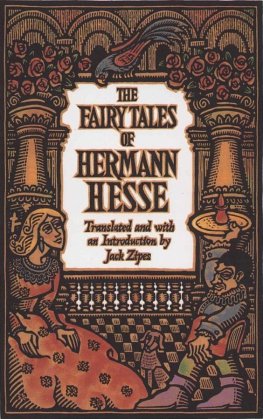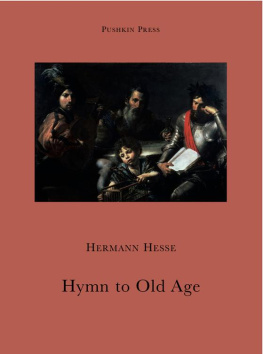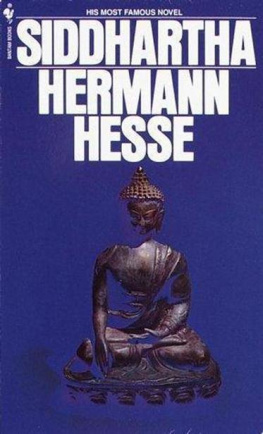Hermann Hesse - Demian
Here you can read online Hermann Hesse - Demian full text of the book (entire story) in english for free. Download pdf and epub, get meaning, cover and reviews about this ebook. year: 2010, publisher: WWW.Bnpublishing.com, genre: Art. Description of the work, (preface) as well as reviews are available. Best literature library LitArk.com created for fans of good reading and offers a wide selection of genres:
Romance novel
Science fiction
Adventure
Detective
Science
History
Home and family
Prose
Art
Politics
Computer
Non-fiction
Religion
Business
Children
Humor
Choose a favorite category and find really read worthwhile books. Enjoy immersion in the world of imagination, feel the emotions of the characters or learn something new for yourself, make an fascinating discovery.
- Book:Demian
- Author:
- Publisher:WWW.Bnpublishing.com
- Genre:
- Year:2010
- Rating:5 / 5
- Favourites:Add to favourites
- Your mark:
- 100
- 1
- 2
- 3
- 4
- 5
Demian: summary, description and annotation
We offer to read an annotation, description, summary or preface (depends on what the author of the book "Demian" wrote himself). If you haven't found the necessary information about the book — write in the comments, we will try to find it.
Demian — read online for free the complete book (whole text) full work
Below is the text of the book, divided by pages. System saving the place of the last page read, allows you to conveniently read the book "Demian" online for free, without having to search again every time where you left off. Put a bookmark, and you can go to the page where you finished reading at any time.
Font size:
Interval:
Bookmark:
Demian
The Story of Emil Sinlair's Youth
by Hermann Hesse
Introduction by Thomas Mann
Translated from the German by
Michael Roloff and Michael Lebeck
a.b.e-book v3.0 / Notes at EOF
Back Cover:
The passionate account of a young man's growing awareness of his own identity, of his involvement in the secret and dangerous world of petty crime, and how, influenced by a precocious schoolmate, he rebels against convention and discovers not only the great joy of independence, but his own new powers for good and evil.
This low-priced Bantam Book
has been completely reset in a type face
designed for easy reading, and was printed
from new plates. It contains the complete
text of the original hard-cover edition.
NOT ONE WORD HAS BEEN OMITTED.
DEMIAN
A Bantam Book / published by arrangement with
Harper & Row Publishers, Inc.
PRINTING HISTORY
Harper Row edition published June 1963
2nd printing ..... June 1963 3rd printing..... August 1963
4th printing ..... July 1966
Bantam edition published October 1966
2nd printing ..... October 1966 3rd printing..... March 1967
4th printing ..... October 1967
Bantam Modem Classics edition published January 1968
6th printing ..... June 1968 8th printing..... February 1969
7th printing ..... October 1968 9th printing..... September 1969
10th printing ..... October 1969
New Bantam edition published June 1970
12th printing ..... October 1970 17th printing..... May 1972
13th printing ..... October 1970 18th printing..... October 1972
14th printing ..... November 1970 19th printing..... December 1972
15th printing ...... July 1971 20th printing..... June 1973
16th printing ..... November 1971 21st printing..... April 1974
22nd printing ..... July 1974
All rights reserved.
Copyright 1923 by S. Fischer Verlag.
Copyright 1963 by Harper & Row Publishers, Inc.
Introduction copyright 1948 by Holt, Rinehart & Winston, Inc.
All foreign language rights in this work are
the property of Suhrkamp Verlag.
This book may not be reproduced in whole or in part, by
mimeograph or any other means, without permission.
For Information address: Harper & Row Publishers, Inc.
10 E. 33 St., New fork, N.Y. 10022.
Published simultaneously tn the United States and Canada
PRINTED IN THE UNITED STATES OF AMERICA
Introduction
A full decade has passed since I last shook Hermann Hesse's hand. Indeed the time seems even longer, so much has happened meanwhile -- so much has happened in the world of history and, even amid the stress and uproar of this convulsive age, so much has come from the uninterrupted industry of our own hand. The outer events, in particular the inevitable ruin of unhappy Germany, both of us foresaw and both lived to witness -- far removed from each other in space, so far that at times no communication was possible, yet always together, always in each other's thoughts. Our paths in general take clearly separate courses through the land of the spirit, at a formal distance one from the other. And yet in some sense the course is the same, in some sense we are indeed fellow pilgrims and brothers, or perhaps I should say, a shade less intimately, confreres; for I like to think of our relationship in the terms of the meeting between his Joseph Knecht and the Benedictine friar Jacobus in Glasperlenspiel which cannot take place without the "playful and prolonged ceremony of endless bowings like the salutations between two saints or princes of the church" -- a half ironic ceremonial, Chinese in character, which Knecht greatly enjoys and of which, he remarks, Magister Ludi Thomas von der Trave was also past master.
Thus it is only natural that our names should be mentioned together from time to time, and even when this happens in the strangest of ways it is agreeable to us. A well-known elderly composer in Munich, obstinately German and bitterly angry, in a recent letter to America called us both, Hesse and me, "wretches" because we do not believe that we Germans are the highest and noblest of peoples, "a canary among a flock of sparrows." The simile itself is peculiarly weak and fatuous quite apart from the ignorance, the incorrigible arrogance which it expresses and which one would think had brought misery enough to this ill-fated people. For my own part, I accept with resignation this verdict of the "German soul." Very likely in my own country I was nothing but a gray sparrow of the intellect among a flock of emotional Harz songsters, and so in 1933 they were heartily glad to be rid of me, though today they make a great show of being deeply injured because I do not return. But Hesse? What ignorance, what lack of culture, to banish this nightingale (for, true enough, he is no middle-class canary) from its German grove, this lyric poet whom Moerike would have embraced with emotion, who has produced from our language images of purest and most delicate form, who created from its songs and aphorisms of the most profound artistic insight -- to call him a "wretch" who betrays his German heritage simply because he holds the idea separate from the form which so often debases it, because he tells the people from whom he sprang the truth which the most dreadful experiences still cannot make them understand, and because the misdeeds committed by this race in its self-absorption stirred his conscience.
If today, when national individualism lies dying, when no single problem can any longer be solved from a purely national point of view, when everything connected with the "fatherland" has become stifling provincialism and no spirit that does not represent the European tradition as a whole any longer merits consideration, if today the genuinely national, the specifically popular, still has any value at all -- and a picturesque value may it retain -- then certainly the essential thing is, as always, not vociferous opinion but actual accomplishment. In Germany especially, those who were least content with things German were always the truest Germans. And who could fail to see that the educational labors alone of Hesse the man of letters -- here I am leaving the creative writer completely out of account -- the devoted universality of his activities as editor and collector, have a specifically German quality? The concept of "world literature," originated by Goethe, is most natural and native to him. One of his works, which has in fact appeared in America, "published in the public interest by authority of the Alien Property Custodian, 1945," bears just this title: "Library of World Literature"; and is proof of vast and enthusiastic reading, of especial familiarity with the temples of Eastern wisdom, and of a noble humanistic intimacy with the "most ancient and holy testimonials of the human spirit." Special studies of his are the essays on Francis of Assisi and on Boccaccio dated 1904, and his three papers on Dostoevski which he called Blick ins Chaos (Glance into Chaos). Editions of medieval stories, of novelle and tales by old Italian writers, Oriental fairy tales, Songs of the German Poets, new editions of Jean Paul, Novalis, and other German romantics bear his name. They represent labor, veneration, selection, editing, reissuing and the writing of informed prefaces -- enough to fill the life of many an erudite man of letters. With Hesse it is mere superabundance of love (and energy!), an active hobby in addition to his personal, most extraordinarily personal, work -- work which for the many levels of thought it touches and its concern with the problems of the world and the self is without peer among his contemporaries.
Next pageFont size:
Interval:
Bookmark:
Similar books «Demian»
Look at similar books to Demian. We have selected literature similar in name and meaning in the hope of providing readers with more options to find new, interesting, not yet read works.
Discussion, reviews of the book Demian and just readers' own opinions. Leave your comments, write what you think about the work, its meaning or the main characters. Specify what exactly you liked and what you didn't like, and why you think so.


